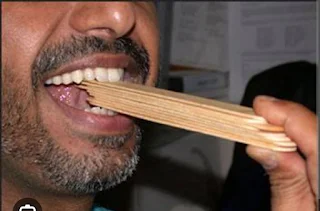Trismus (lockjaw)and its physiotherapy management.
Trismus, also known as lockjaw, is a condition characterized by the inability to fully open the mouth due to muscle spasms or stiffness in the jaw. It can be caused by various factors and can have several underlying etiologies. Here is an overview of trismus, including its causes, diagnosis, management, and physiotherapy treatment options.
Causes and Etiology:
- Temporomandibular Joint Disorders (TMD): Dysfunction or inflammation of the temporomandibular joint can lead to trismus.
- Dental Conditions: Trauma, tooth abscesses, infections, or dental procedures like wisdom tooth extraction can cause trismus.
- Oral or Maxillofacial Infections: Infections in the mouth, such as cellulitis or Ludwig's angina, can result in trismus.
- Head and Neck Cancer: Tumors in the head and neck region or radiation therapy for cancer treatment can lead to trismus.
- Muscle Spasms or Tetanus: Conditions that cause muscle spasms, like tetanus, can cause trismus.
- Other Causes: Trauma to the jaw, excessive teeth grinding (bruxism), or certain medications can also contribute to trismus.
Diagnosis:
Diagnosing trismus involves a thorough medical history review, physical examination, and possible diagnostic tests. The healthcare provider may examine the jaw's range of motion, check for muscle tenderness, and evaluate the underlying cause through imaging studies, such as X-rays, CT scans, or MRI.
Management:
The management of trismus depends on its underlying cause. The primary objective is to address the root cause while providing symptomatic relief. Here are some general management approaches:
- Medications: Analgesics, muscle relaxants, and anti-inflammatory medications may be prescribed to reduce pain and muscle spasms.
- Antibiotics: If an infection is present, antibiotics may be prescribed to treat the underlying cause.
- Dental Interventions: Dental procedures, such as tooth extraction, root canal treatment, or restoration, may be necessary to resolve dental-related causes of trismus.
- Physical Therapy and Jaw Exercises: Physiotherapy and specific jaw exercises can help improve jaw mobility and reduce muscle stiffness. This includes stretching exercises, manual therapy techniques, heat or cold therapy, and ultrasound therapy.
- Physiotherapy Treatment:
- Physiotherapy plays a crucial role in managing trismus. A physiotherapist specializing in orofacial rehabilitation can design a personalized treatment plan based on the underlying cause and individual needs.
Physiotherapy treatment may include:
- Passive and Active Jaw Exercises: Controlled stretching and range of motion exercises can improve jaw mobility and muscle flexibility.
- Manual Therapy: Techniques such as massage, myofascial release, or trigger point therapy can help relieve muscle tension and promote relaxation.
- Heat and Cold Therapy: The application of heat or cold packs can reduce pain, inflammation, and muscle spasms.
- Electrical Stimulation: Transcutaneous electrical nerve stimulation (TENS) or other forms of electrical stimulation may be used to relieve pain and improve muscle function.
- Education and Self-Management: Physiotherapists can provide education on proper jaw positioning, relaxation techniques, and home exercises for self-management.
It's important to consult with healthcare professionals, such as dentists, oral and maxillofacial surgeons, or physiotherapists, to receive an accurate diagnosis and appropriate treatment for trismus. They can tailor the management plan to address the specific underlying cause and individual needs.








Comments
Post a Comment